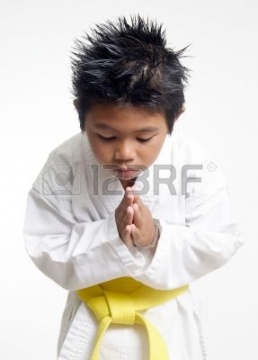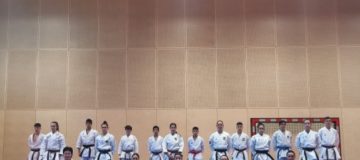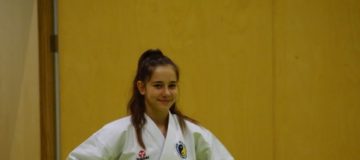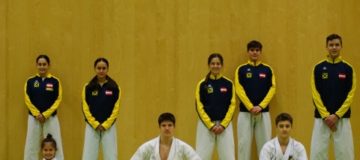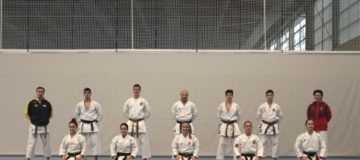(+ When You Should NEVER Say It)
Imagine…
If there was a magical word that could be used for nearly anything.
Wouldn’t that be AWESOME?
Well, for many martial artists there is such a word!
I’m talking about “Osu!” (pronounced “Oss!”)
In a lot of Karate schools, and even some BJJ / MMA gyms, the term “Osu!” seems to mean everything and anything – including: “hi”, “hello”, “goodbye”, “okay”, “thanks”, “excuse me”, “hey there”, “come here”, “go there”, “what’s up”, “look at me”, “do it this way”, “that way”, “do you understand?”, “I understand” and “train harder”.
It is the ultimate utility word for many martial artists!
Insanely useful.
And insanely m-i-s-u-n-d-e-r-s-t-o-o-d.
Look…
If you think “Osu!” is an all-purpose secret word that you can use with your dojo buddies while on the phone, at the mall, when doing dishes or walking your dog – you’re not only using it horribly wrong, but also promoting the kind of group-think mentality that got today’s music culture to the dreadful stage it’s at today.
That’s right.
You’re the reason Justin Bieber got big.
*shrudder*
Jokes aside, let’s get serious:
What exactly does this magical “Osu!” even mean?
- Where does the term come from?
- When should you use it?
- Why do some people use it for everything?
- Do you really need to use it?
- Most importantly; what’s the #1 time when you should NEVER use it?
Check it out:
The History & Origins of “Osu!”
According to history books, the expression “Osu!” first appeared in the Officers Academy of the Imperial Japanese Navy, in the early 20th century.
This fact, combined with the fact that “Osu!” is non-existent in traditional Karate dojos of Okinawa (read more about that here), tells us two things:
- The term did not originate in the birthplace of Karate (Okinawa).
- It has militaristic, group-think mentality undertones.
In other words…
There is something fishy going on!
Funnily enough, many Japanese people don’t even know themselves where the expression comes from. I know because I used to live and train there.
That being said, several theories exist on its true meaning and origins.
It’s a phenomenon – even in Japan!
So…
Let me now present three of the most prevailing theories on the origins of “Osu!”.
#1: The Kyokushin Theory
The first theory comes from Japanese full-contact Kyokushin Karate.
You see, in Kyokushin it’s common wisdom that the term “Osu!” stems from a longer phrase known as “Osu no Seishin”.
In this particular case, “Osu!” is a combination of two different kanji (Sino-Japanese characters), namely the verb ‘osu’ which means “to push”, and ‘shinobu’ which means “to endure/suffer” or “to hide”.
Put together, these two kanji form a new compound word, which can symbolize a lot of stuff, depending on who interprets it: “combat spirit”, “the importance of effort” “the necessity to overcome all obstacles by pushing them aside”, “advancing with a steady positive attitude”, “not showing suffering” and “the spirit of perseverance” are some of the commonly cited meanings of this “Osu!” version.
In other words, since Kyokushin Karate requires extreme amounts of physical conditioning and guts – this theory says that you are verbally reminding yourself to breach your comfort zone by putting your physical/mental limits to the test every time you say “Osu!”.
Pretty badass!
But, is ‘The Kyokushin Theory’ the main reason for today’s ubiquitous usage of “Osu!”?
That remains a mystery.
Let’s move on…
#2: The ‘Good Morning’ Theory
The next theory comes from Dr. Mizutani Osamu in Japan.
“Hey ya!”
Dr. Mizutani, a linguistics professor at the University of Nagoya and frequently quoted in The Japan Times as a “language expert”, talks in his work about a fascinating experiment he once conducted with a group of random people in order to observe the various ways in which subjects would return a simple morning greeting.
Put briefly, Dr. Mizutani greeted unknown people on the streets of Nagoya with the expression “Ohayo gozaimasu!” (the most polite Japanese equivalent of “Good morning!”) and noted the different responses.
The result?
Although most subjects replied in a similar manner (“Ohayo gozaimasu!”), during the course of the experiment Dr. Mizutani noticed that greetings changed as situations changed.
Joggers, for instance, involved in an athletic activity, responded with considerably rougher language than people who were just out for a stroll or walking their dog.
As a matter of fact, Dr. Mizutani found that most of the joggers responded with shorter and shorter forms of the greeting, like “Ohayossu!”, “Ohayoosu!”, “Oossu!”, or simply…
“Osu!”
So, the conclusion drawn by Mizutani was that “Osu!” is a very rough masculine expression used mainly by young men toward other men, most often while engaged in athletic activities, and that it basically means “Hey ya!” in English.
But, is Dr. Mizutani’s observation of “Osu!” the main reason for our omnipresent usage of “Osu!” in modern Karate?
That remains a mystery.
Next up…
#3: The Onegaishimasu Theory
This last theory is called ‘The Onegaishimasu Theory’.
It’s similar to the previous ‘Good Morning Theory’ in the sense that a longer (formal) Japanese expression gets shortened to a more pragmatic (but less respectful) version.
“Onegaishimasu!”
In this case, the original phrase is “Onegaishimasu”, a word that most Karate practitioners have surely heard, or perhaps even used themselves, in the dojo.
Although “Onegaishimasu” is one of the most common expressions used in Japanese everyday language, it’s actually a pretty hard-to-translate term in English, and the closest equivalents I can come up with are “Please”, “Do me the favor”, or “Grant me the pleasure”, i.e. inducing a mutual feeling of reprocity and gratitude.
So, how does “Onegaishimasu” become “Osu!”?
Well, I actually noticed this phenomenon unfold myself on several occasions when I lived in Japan: While most regular students would exclaim “Onegaishimasu” as they bowed to each other before beginning an exercise, a couple of youngsters would always gradually shorten the phrase, until, by the end of class, the only thing that could be distinguished from the intended “Onegaishimasu” was a simple “Osu!” grunt.
Needless to say, these same youngsters would regularly shorten the expression “Otsukaresamadeshita” (a traditional phrase said after you finish training/work/school) to a simple “Tsukare!”.
So…
Is this the ultimate reason for why so many Karate people use “Osu!” like crazy?
Maybe!
Now check this out:
When You Should NEVER Use “Osu!”/”Oss!”
Okay…
With the history lesson out of the way, let’s finish off with a bang.
Although the usage of “Osu!” has reached embarassing heights in modern Karate today (including some MMA and BJJ gyms), people are bound to keep using it because of its newfound meaning in martial arts circles as a handy, all-encompassing utility word.
That’s fine.
You should definitely do what you instructor says!
But…
No matter what reason or meaning you attach to the word “Osu!”, you MUST know this one thing:
Never say it to a Japanese person – unless he is younger than you, lower in rank, or wants you to say it (► if you’re a woman, don’t say it at all).
You see, at the end of the day, it doesn’t matter if the term “Osu!” derives from the philosophical concept of “to endure pain and suffering” (The Kyokushin Theory), from the greeting “Ohayo gozaimasu” (The ‘Good Morning’ Theory) or from the phrase “Onegaishimasu” (The Onegaishimasu Theory): As a rough, masculine expression, “Osu!” should be used very carefully, especially toward Japanese masters and people of higher rank/status/age than you – and more so if you are a woman.
This is a VERY touchy subject!
“Osu!” expresses a strong assertiveness, masculinity and “let’s-kick-butt” spirit in Japanese.
It’s not something you say at the dinner table.
Remember this:
- Don’t use “Osu!” as a prefix and suffix to everything you say.
- Don’t take part in the “Osu!” parade just because everyone else does.
- Think for yourself – let’s not create a new Justin Bieber.
Look…
I totally get it.
It’s fun to imitate Japanese culture (in some dojos, this seems to be what 99% of class is about), and it’s not a federal crime to use “Osu!” inappropriately. But it should be used in full understanding of its meaning and implications – and only if you feel you can stand behind it.
So what should you say instead?
In 9 times out of 10, there are two very good options:
- Say “Hai!”…
- …or say nothing.
“Hai!” is the commonly used word in Japanese for “yes”/”understood”/”affirmative”.
That’s what we say in Okinawa – the birthplace of Karate – as well as in many other places where the “Osu!” parade hasn’t arrived yet and people value humility.
Most importantly; just shut up & train.
(Especially if you’re a certified Karate Nerd™)
However, if your instructor demands “Osu!” – go ahead and say it.
Because it would be disrespectful to not say it.
At the end of the day, that’s what matters.
“Karate wa rei ni hajimari, rei ni owaru.”
(“Karate begins & ends with respect.”)
– Funakoshi Gichin (1868-1957)
Get it? ; -)
Thanks for reading!
/Jesse
PS. Do you use “Osu!”/”Oss!”? Leave a comment below.
About the author
Jesse Enkamp is a self-titled Karate Nerd™, #1 Amazon best-selling author, national champion and founder of Seishin – the world's first crowdfunded & crowdsourced gi. He thinks you should become a Karate Nerd™ too.

